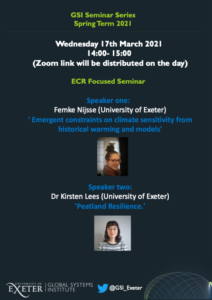
Taken from GSI Seminar coordinator Daneen Cowling’s Blog
For the final seminar of the term we hosted an Early Career Researcher special event. We were excited to host a pair of impressive researchers within the GSI; Dr Femke Nijsse and Dr Kirsten Lees.
Dr Femke Nijsse: Emergent constraints on climate sensitivity from historical warming and models
Dr Nijsse gave a talk on her the work of her PhD exploring the climate model uncertainties on both transient timescales and long-term projections. Dr Nijsse introduced the difficulty around predicting climate change: bottom-up methods which use climate models and are limited by feedback and aerosol uncertainty. While top-down methods which use accurate historical temperature rise and radiative forcing and ocean heat uptake. Emergent contraints modelling permits the use of both of these methods which can provide climate sensitivity.
Dr Nijsse explored ways to address uncertainty – specifically with aerosols, whereby for periods of lesser aerosol influence can be used. How well models are able to constrain estimates, can be explained by grouping their sensitivity. To then apply an Emergent Constraints Model, Dr Nijsse laid out the following methods:
- Use historical warming since 1975 (for relative aerosol stability)
- Compute model ECS and TCR
- Model historical warming
- Determine function form of emergent constraint
Dr Nijsse also exposed how the ratio relationship between ECS and TCR can increase with climate sensitivity, as some models with a moderate TCR values can exhibit a higher range of ECS values. From her research, Dr Nijsse concluded it would be unlikely for an ECS > 4.5 K and TCR > 2.5 K. ECS may also be restricted using ocean heat uptake.
To end her seminar, Dr Nijsse also introduced her current work on her postdoc with the Economics of Energy Innovation and System Transition Project. The project is an international effort to enhance energy-environment-economy models, and integrate non-equilibrium ideas into equilibrium models. Dr Nijsse is modelling the challenges of renewable energy – from variability in wind and sun production to diffusion and learning of cost and storage.
Dr Kirsten Lees: Peatland Resilience
Dr Lees talk was on her Peatland Resilience research. Introduced with what Peatlands are and the suite of ecosystem services they offer – ranging from Carbon storage, flood management and biodiversity. Dr Lees then explained how to assess the resilience of these systems, using indicators from remotely sensed data. To measure resilience, the following steps can be applied to a site:
- Choose a resilience metric
- Detect a disturbance event
- Measure recovery time
Dr Lees has applied these steps to water levels and vegetation burn recovery to understand peatland resilience. From her analysis, Dr Lees suggests a complex interaction of factors influencing peatland resilience. Restoration and wildfire are factors with the most potential to alter peatland resilience, and so will be important to observe in the future.
This seminar was a great opportunity to hear about the impressive work being done by researchers at the start of their career, as well as a fresh insight into the diverse research of the GSI.
To watch these two talks and the questions from the audience, click this link.
If you would like to give a talk at a future seminar, please contact event organisers Daneen Cowling (dc456@exeter.ac.uk) and Guy Lomax (g.lomax@exeter.ac.uk)
